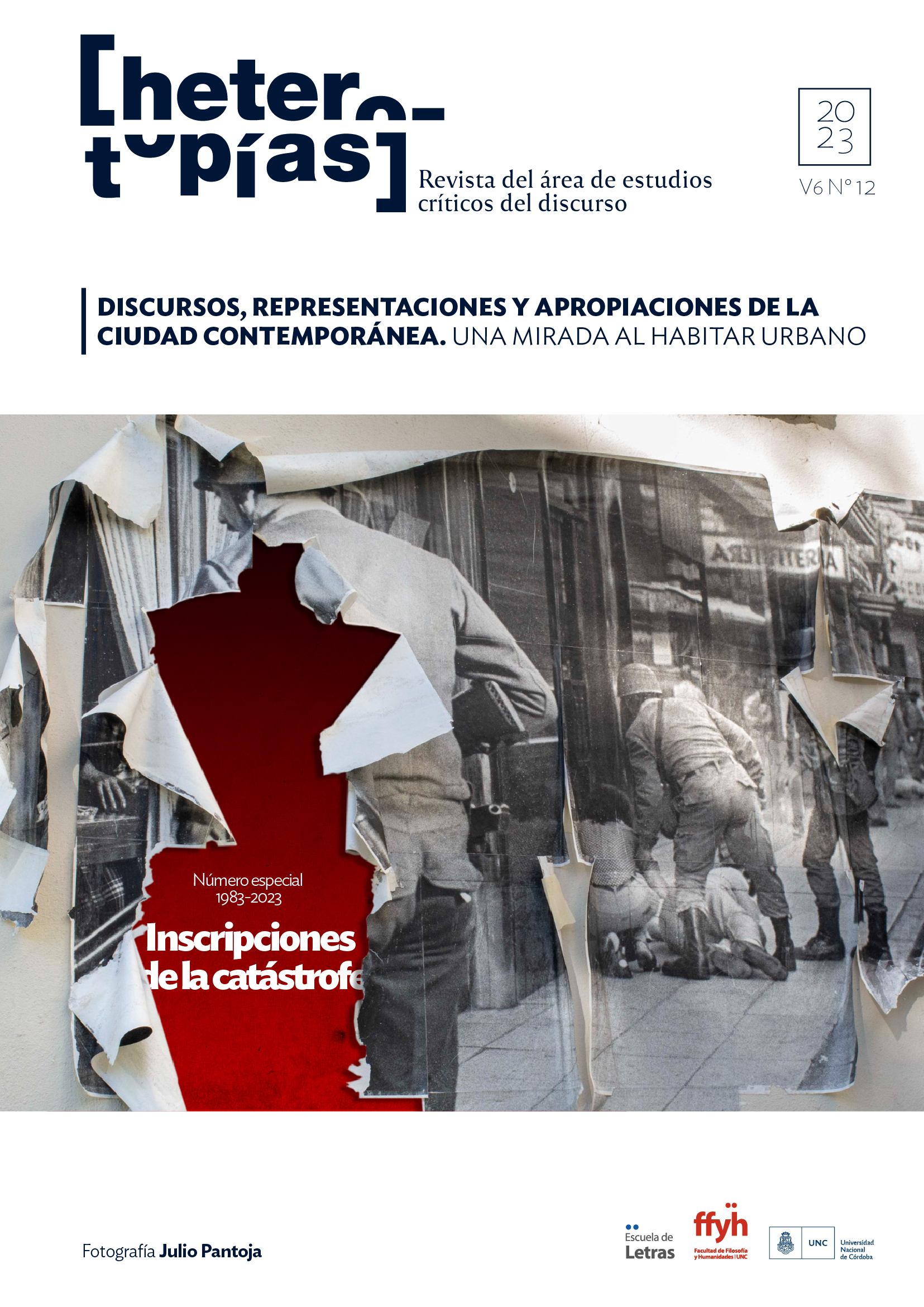Interweaving public space with new forms of democracy from Latin America
Main Article Content
Abstract
The reflection on a pluralistic, intercultural and transmodern democracy enables the debate to recover the social meaning of public space as a right and for the enjoyment of the entire society. Furthermore, it enables new relationships between the public and the private, but also between professionals and the community in general, considering in turn criteria of complementarity, in a relationship with nature, territory and sustainability. To address these ideas, we focus on the framework of the debate on the proposed ordinance that, in 2022, was managed by the municipality of Córdoba for the regularization of neighborhoods with a closed perimeter, and which according to current regulations should be open. We consider the various discourses deployed by the actors to defend their position through the dispute that occurs between the government and society, but also within each one. Subsequently, we investigate political categories such as universality and the people in relation to public space, glimpsing the capacity for agency that occurs from another that was considered passive and that can assume collective forms. Currently there are approximately 80 neighborhoods with these characteristics within the city. The conflict is established when the public space is subordinated to the antagonism of contingent wills, which is why it is also necessary to attend to the creation of a common sense to develop a more tolerable general will in the face of a different other. Not only from politics, from what is instituted, can the established order be changed, but from society itself. Professionals, based on their specificities, should deploy their skills at the service of negotiations to achieve consensus and guide possible actions for a more inclusive and accessible city for all.
Downloads
Article Details

This work is licensed under a Creative Commons Attribution-NonCommercial-ShareAlike 4.0 International License.
Those authors who have publications with this journal, accept the following terms: Those authors who have publications with this journal, accept the following terms:
a. The authors will keep their copyright and guarantee to the journal the right of first publication of their work, which will be simultaneously subject to the Creative Commons Attribution - Non-Commercial - Share Alike (by-nc-sa) Attribution License; no commercial use of the original work or any derivative works is allowed, the distribution of which must be done with a license equal to the one that regulates the original work.
b. Authors may adopt other non-exclusive license agreements for the distribution of the published version of the work (e.g., deposit it in an institutional telematic archive or publish it in a monographic volume) provided that the initial publication in this journal is indicated.
c. Authors are allowed and recommended to disseminate their work through the Internet (e.g. in institutional telematic archives or on their website) before and during the submission process, which may lead to interesting exchanges and increase the number of citations of the published work. (See The effect of open access).
How to Cite
References
Bentley, I. (2004). Urban transformations: Power, people and urban design. Routledge.
Bentley, I., Alcock, A., & Murrian, P. (1999). Entornos vitales: hacia un diseño urbano y arquitectónico más humano manual práctico.
Berroeta Torres Héctor y Vidal Moranta Tomeu. (2012). «La noción de espacio público y la configuración de la ciudad: fundamentos para los relatos de pérdida, civilidad y disputa», Polis [En línea], 31 |
Borja, J., & Muxí, Z. (2001), Espacio público: Ciudad y ciudadanía. Editorial Electa. Barcelona.
Borthagaray, Andrés. (2009). Ganar la calle: compartir sin dividir. Infinito.
Café de las Ciudades (14 de julio de 2023). Carta abierta a las y los concejales de la ciudad de Córdoba. https://cafedelasciudades.com.ar/articulos/carta-abierta-a-las-y-los-concejales-de-la-ciudad-de-cordoba/
Castro Gomez, Santiago. (2015). Revoluciones sin sujeto. Slavoj Zizek y la crítica del historicismo posmoderno, (pp. 223-379). AKAL.
---------------------------------- (2017). ¿Qué hacer con los universalismos occidentales? Observaciones en torno al “giro decolonial” Analecta Política, 7(13),249-272.
Cisterna, Carolina; Representaciones espaciales en la producción habitacional estatal: Programa “Nuevos Barrios. Mi Casa, Mi Vida”, Argentina; Universidad Nacional Colombia. Facultad de Artes; Bitácora Urbano-Territorial; 21; 2; 12-2012; 147-156
Rey, F. G. (2012). Del discurso del desarrollo a la visión territorial sostenible. Perspectiva Geográfica: Revista del Programa de Estudios de Posgrado en Geografía, (17), 233-258.
Langbehn Lorenzo, Montera Carolina, Paschkes Ronis Matías, Tobias Melina. (2011). Ambiente, territorio y organizaciones sociales. Reconfiguraciones de la noción de ciudadanía en torno a la cuestión ambiental en Herzer, Hilda María, Di Virgilio, Mercedes, Merlinsky Gabriela ,Rodríguez María Carla, -compiladoras. La cuestión urbana interrogada: trasformaciones urbanas, ambientales y políticas públicas en
Argentina. (pp.431-459). Café de las ciudades.
Lugones M. Gabriela, Jiménez Zunino Cecilia, Pilatti Camila. (2022). “Entregar el liderazgo de los hechos urbanos al sector privado preanuncia la muerte de la ciudad”. Entrevista con Marcelo Corti y Fernando Díaz. Etcétera. Revista del área de Ciencias Sociales del CIFFyH. (No 11)
https://revistas.unc.edu.ar/index.php/etcetera/article/view/39888
Marconetti, Diego. (26 de enero de 2023). Ciudad de Córdoba: qué pasará con la regularización de los barrios con seguridad. La Voz del Interior. https://www.lavoz.com.ar/ciudadanos/ciudad-de-cordoba-que-pasara-con-la-regularizacion-de-los-barrios-con-seguridad/
Marconetti, Diego. (23 de mayo de 2023). Cada vez más son los espacios verdes enrejados en la ciudad de Córdoba: ¿cuál es el criterio?
Proyecto de Ordenanza 10174/C/22 “Régimen de Regularización para Loteos con Perímetro Controlado” asimilables a las urbanizaciones de la Ordenanza N°8606 – Urbanizaciones Residenciales Especiales-
Romo, C. (2015). Las urbanizaciones residenciales cerradas en la periferia de Córdoba Nuevas modalidades en la expansión suburbana del siglo XXI. PENSUM, 1(1). https://doi.org/10.59047/2469.0724.v1.n1.12749
Santos, Milton. (1996). De la totalidad al lugar. Oikos Tau
Tapia, Luis. (2009). Intergubernamentalidad igualitaria. Pensando la democracia geopolíticamente. Muela del Diablo Editores CIDES-UMSA. CLACSO. Comuna.
